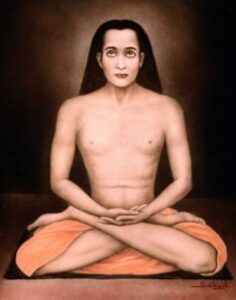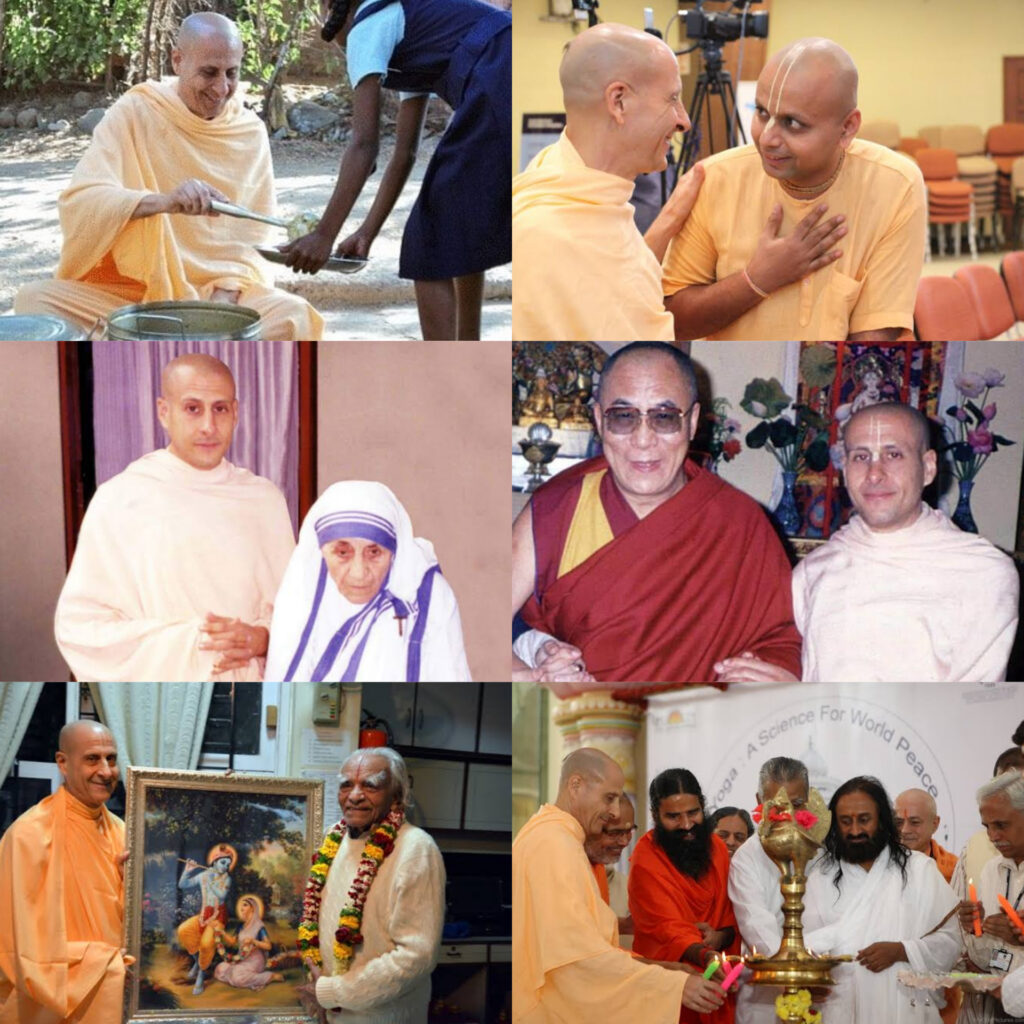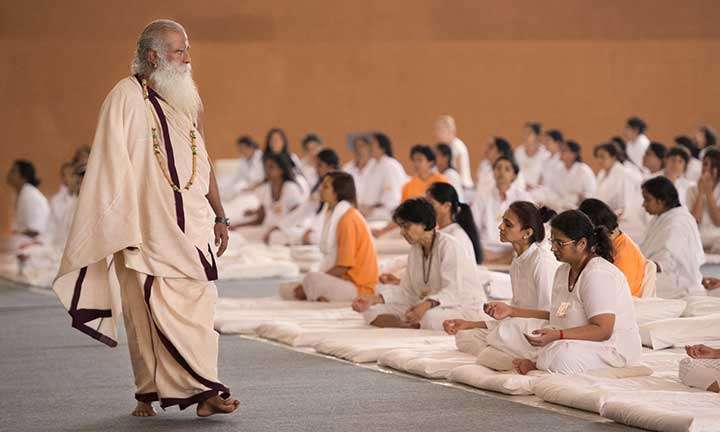In this article we will be looking at some spiritual stuff! I actually wanted NOT to write any spiritual stuff on my blog, and limit the spiritual stuff only to my Quora handle and other social media platforms. But, since I am touching many topics here – management, communication skills, sexuality, martial arts, and various other stuff, I thought it’s fine to write a single article related to spirituality. And it’s very relevant – because spirituality is the cornerstone of congruent leadership. Leadership is essentially about creating a positive impact in society, and what you can offer is only to the extent of how you are within yourself. So taking care of one’s inner well-being is extremely important before trying to make something happen in the world.
Before going to specific stuff, let me give a brief intro of my spiritual life. I am a practitioner of Isha Yoga, starting from January 2016 (that’s when I attended the Inner Engineering program). But my exposure to spirituality started way back – from my childhood itself. Though there have been many imperfections in my family, this is something I am very grateful about.

One of my strong childhood memories is that of a photo at home, of Mahavatar Babaji surrounded by the saints of that tradition. And, in my home, there were many books, related to various schools of spirituality, which began to increase in number gradually. And I myself began to get highly influenced by Swami Vivekananda from my high school.
An interesting conversation!
During my first year of college (BITS Pilani Hyderabad Campus), in late 2013 or early 2014, I along with some friends went to Shri RamaChandra Mission (also known by the names Sahaj Marg & Heartfulness) center which was very close to our college. It was a beautiful residential area for the practitioners of that system.
We went to a house where we are supposed to get an introduction to the system. An aged lady came to us and introduced herself and told that she lives there along with her husband. She told us that she is a preceptor– one who is prepared by the Master of that system to guide others towards the practice. She told us that, if we are willing to practice that path, we have start by taking sittings with preceptor.

During the conversation, she told something like: “RamaChandra Mission is not like RamaKrishna Mission where one is expected to be celibate. Here one can have both spiritual and material aspects of life.” I now understand that she meant no disrespect for RamaKrishna mission, but at that time, I guess I got an impression that she was talking low of RamaKrishna Mission – a system of Swami Vivekananda whom I have immense respect for.
After the conversation with her, we came back to our college. After many days, when I took bus from our college to some place in Hyderabad, I met a person in the bus. We began to have conversation, and he told me that he is parent of a student from our college and that he is a practitioner (or a preceptor – I don’t remember exactly) of RamaChandra Mission. And during our conversation, he quoted Vivekananda (in a positive way) while telling a point. I was surprised! I was under the impression that there’s some kind of friction between these two systems – but this man had a great respect for Swami Vivekananda! This incident really made an impact on me – that it’s not necessarily the systems but the various ways that people explain and understand things that really cause the friction between systems.
My time with ISKCON
The trip to Ramachandra Mission I mentioned above was during a time when I had a spiritual orientation but wasn’t really deep into it. But then certain things happened in my life which made me an intense seeker and, during the time of 2014-15, I began to explore various spiritual systems, masters and methods: Jiddu Krishnamurthy, Osho, Ramachandra Mission (this time more deeply), Ramakrishna Mission, Ekhart Tolle, Deepak Chopra, Ekkirala Bharadwaja (the teachings related to Sai Baba), Yogada, Christianity, etc. And a system I spent considerable time with is ISKCON.
For those who don’t know, ISKCON was founded by Srila Prabhupada – a really wonderful being. Chanting of Hare Krishna mantra is the core of the ISCKON system, along with sankirtans, prasads and reading/listening the scriptures. I had a really beautiful time with the ISKCON Hyderabad community and at times had really powerful experience.
And there were also some things that were uncomfortable to me. ISKCON places a very high importance to authority of scriptures, while I prefer to give importance to knowing by experience than belief systems. And another aspect was – Srila Prabhupada himself was against Advaita and what is referred to as Mayavadi in ISKCON community. Adi Shankaracharya, Buddha, RamaKrishna Paramahansa, Sadhguru Jaggi Vasudev and many other saints and mystics whom I revere are tagged as Mayavadis and are not to be followed (as per the philosophy of Srila Prabhupada). Eventually, I didn’t proceed further with the ISKCON community.
Sometime later, after I got initiated into Isha Yoga, through one of my professors I came to know about an ISKCON guru called Radhanath Swami. My professor gave me a copy (it seems that he keeps copies of the book so that he can distribute them freely – what an amazing person my professor is!) of autobiography of Radhanath Swami called “Journey Home : Autobiography of an American Swami”. The more I began to know about Radhanath Swami, the more I began to get mesmerized by him! He was the opposite of everything that I disliked in ISKCON community.
Radhanath swami was born in Chicago in 1950. In a spiritual quest, he travelled (most hitchhiked) from America to Europe, and through Middle East he reached India. During his travels he met people from various cultures, spiritual students of various traditions and many spiritual masters. Though he later got initiated into ISKCON, he continues to cherish the various beautiful things he learnt from various people, traditions and masters during his journey. This’s really beautiful for me – especially after interacting with many people who advocate that only a specific way is the right path!

But Srila Prabhupada himself criticized Mayavadis right?! Well it’s true and I think it’s actually appropriate during that time. ISKCON movement happened during the Counterculture (Hippie) movement and there were many weird, harmful practices such as drugs, LSD etc and many impostors posing as Gurus came up. Something like the ISKCON movement was very necessary at that time and Srila Prabhupada criticizing certain methods and ways was very appropriate in that context. Interestingly, it’s during such times of societal degradation in the past various schools of Vedanta such as Advaita, Dvaita (ISKCON belongs to this) and Vishishtadvaita have originated. In my understanding, they have originated not because a specific school is ultimate and THE RIGHT one, but because that specific school was most appropriate for what ever was happening in the society at that point of time.
While many members in the ISKCON community focus on the criticisms that Srila Prabhupada made, Radhanath Swami’s focus is on the humility, love, commitment and other wonderful qualities of Srila Prabhupada, and while trying to emulate those qualities of his Master, he continues to embrace the wisdom he received from many other sources during his journey. Here is a beautiful Ted Talk of Radhanath Swami if you want to know more about him.
In the recent years, I have seen another monk from ISKCON community to exhibit wonderful wisdom and expound knowledge in a contemporary context, instead of focusing on all the frictional part. I am talking about Gaur Gopal Das – probably you heard of him and watched his videos. In case you don’t know, Gaur Gopal Das is a disciple of Radhanath Swami! The first time I came to know about this, I felt really happy about it and thought: “Of course! Only such great beings can mentor and nurture such open-minded students”. There are actually some criticisms within ISKCON community that Radhanth Swami and Gaur Gopal Das are deviating the ISKCON process, but I think they are doing things in a very appropriate way – the way the world actually needs it to be done.
Deep as the oceans, vast as the skies
Above stories and stuff I shared with you – are mainly to illustrate this point: to be as deep as the oceans and at the same time be as vast as skies! What do I mean by this? Well, in my understanding and experience, most people fall into either of these two categories:
- To be deep into a system and get into a fanatical mode, or
- To see everything with a fancy idea of “equality” but they themselves are very casual and don’t practice or do something significant for their growth

But the best way, in my view, is to go deeper into a system and yet embrace and respect all other systems. All the various kinds of conflict, hatred and non-sense in the world would end if we all can come to this simple and very important understanding.
Taking my case an example, I did my first Isha Yoga Program (Inner Engineering) in 2016 and I have been through advanced Isha programs also, but still, after 5 years of sadhana, I am only beginning to realize the depth and profoundness of the simple things that I learnt in my very first program. I came looking at a drop and there is an ocean over here! I wouldn’t have experienced what I have been immensely fortunate to experience if I didn’t persist on my path. At the same time, I cherish, embrace and bow down to the wisdom of various different traditions and paths that I came across & continue to come across. It is only because of the inspiration and assistance of the wonderful beings in Isha and other systems that I am able to pursue this spiritual path to whatever extent that I am able to.

And I would like to end this blog post with Swami Vivekananda’s speech at Parliament of World Religions in 1893, which made him an international icon and symbol of universal brotherhood. This is his first speech in the series of talks he delivered there, and represents the crux of my blog post:
Sisters and Brothers of America,
It fills my heart with joy unspeakable to rise in response to the warm and cordial welcome which you have given us. I thank you in the name of the most ancient order of monks in the world, I thank you in the name of the mother of religions, and I thank you in the name of millions and millions of Hindu people of all classes and sects.
My thanks, also, to some of the speakers on this platform who, referring to the delegates from the Orient, have told you that these men from far-off nations may well claim the honor of bearing to different lands the idea of toleration. I am proud to belong to a religion which has taught the world both tolerance and universal acceptance. We believe not only in universal toleration, but we accept all religions as true. I am proud to belong to a nation which has sheltered the persecuted and the refugees of all religions and all nations of the earth. I am proud to tell you that we have gathered in our bosom the purest remnant of the Israelites, who came to Southern India and took refuge with us in the very year in which their holy temple was shattered to pieces by Roman tyranny. I am proud to belong to the religion which has sheltered and is still fostering the remnant of the grand Zoroastrian nation. I will quote to you, brethren, a few lines from a hymn which I remember to have repeated from my earliest boyhood, which is every day repeated by millions of human beings: “As the different streams having their sources in different paths which men take through different tendencies, various though they appear, crooked or straight, all lead to Thee.”
The present convention, which is one of the most august assemblies ever held, is in itself a vindication, a declaration to the world of the wonderful doctrine preached in the Gita: “Whosoever comes to Me, through whatsoever form, I reach him; all men are struggling through paths which in the end lead to me.” Sectarianism, bigotry, and its horrible descendant, fanaticism, have long possessed this beautiful earth. They have filled the earth with violence, drenched it often and often with human blood, destroyed civilization and sent whole nations to despair. Had it not been for these horrible demons, human society would be far more advanced than it is now. But their time is come; and I fervently hope that the bell that tolled this morning in honor of this convention may be the death-knell of all fanaticism, of all persecutions with the sword or with the pen, and of all uncharitable feelings between persons wending their way to the same goal.
